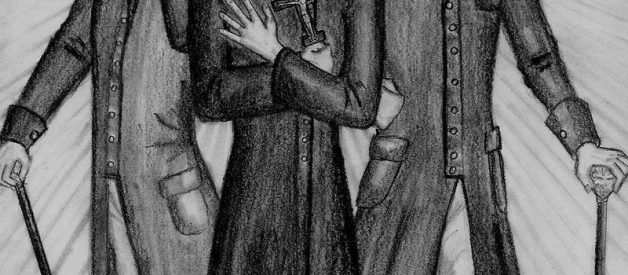Analyzing the Famous Theological Digression in Dostoevsky?s Masterpiece
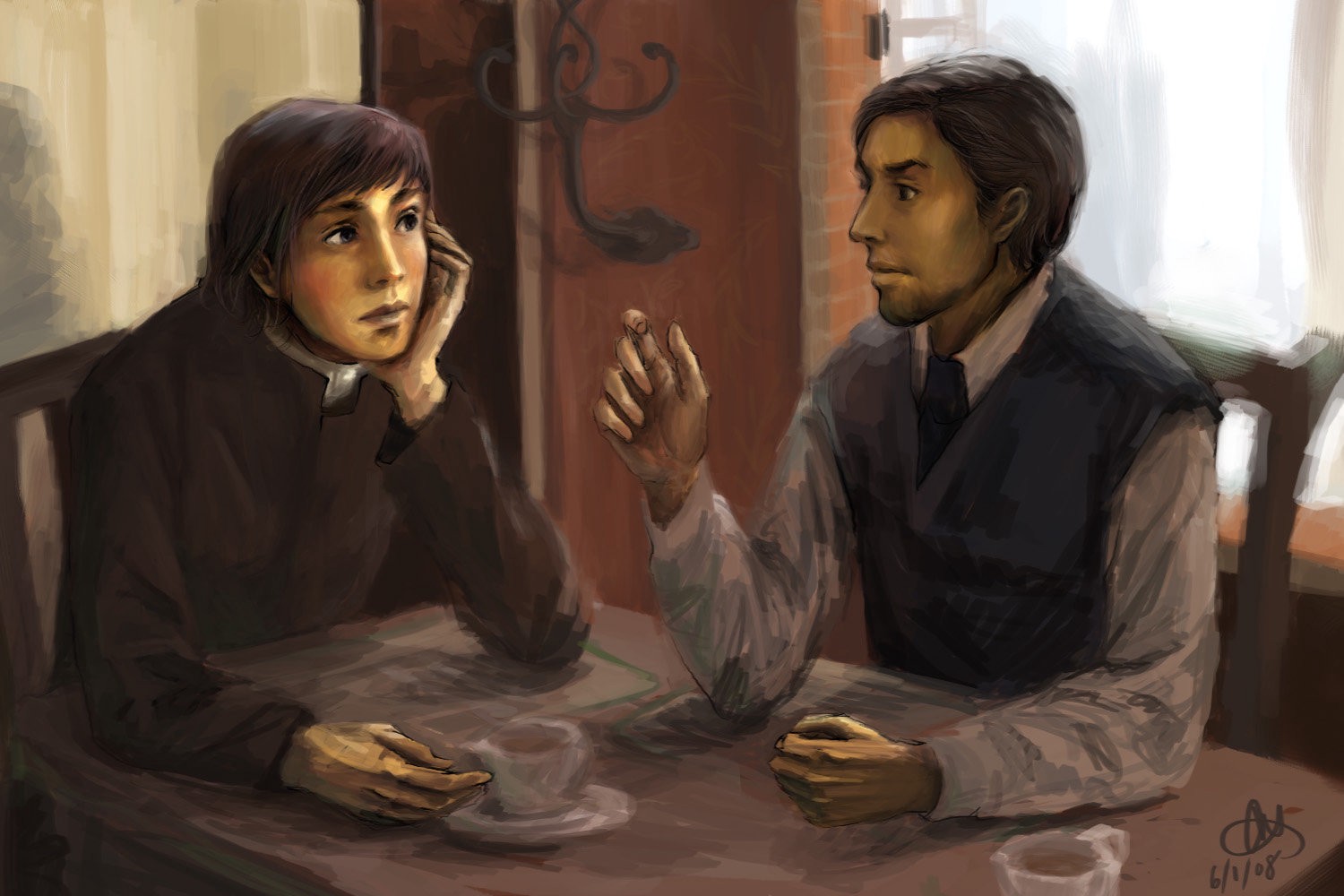 Ivan Tells Alyosha the story of The Grand Inquistor at a Restaurant
Ivan Tells Alyosha the story of The Grand Inquistor at a Restaurant
?I?d die happy if I could finish this final novel, for I would have expressed myself completely.?
? Dostoevsky, about Brothers Karamazov.
Dostoevsky imbued each of Fyodor Karamazov?s sons with huge parts of himself.
Alyosha, who shares a name with the author?s young son who died during the writing the novel, is the spiritual side of Dostoevsky, one who is striving to achieve Dostoevsky?s own spiritual ideal.
Dmitri is the passionate side of the man, one whose lips drip with verses from Dostoevsky?s favorite poems, and whose financial woes match those of the author who once wrote to his brother about how, on his watch, ?the roubles scurry like crabs in all directions.?
Smerdyakov is a creation that allows the author to view the world through the eyes of someone who has known terrible suffering and bitterness, a creation that allows Dostoevsky to argue against the ethics of revolutionary youth in Russia in the late 19th century, even as he shows them empathy and understanding.
Ivan, the intellectual of the clan, gives Dostoevsky a voice for his most provocative philosophical musings.
In many ways, Ivan is the most fascinating character of the four. The big thoughts, the penetrating, vexing theological problems of Brothers Karamazov, largely get presented from Ivan?s point of view. In giving the big digressions of the novel to Ivan, a character whose worldview doesn?t match and in many ways is opposed to the author?s own, Dostoevsky allows himself to argue both sides, and to show how a philosophical argument that may sound impenetrably perfect in theory becomes convoluted and problematic in practice.
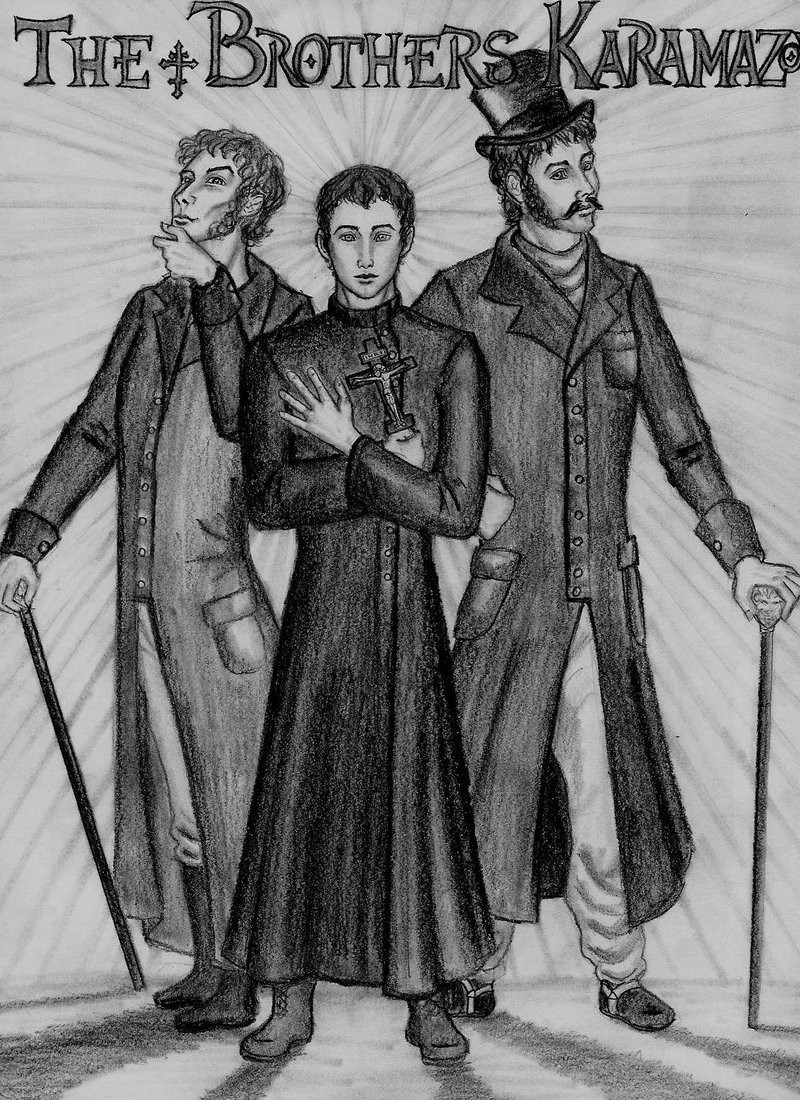 Dmitri, Alyosha, and Ivan Karamazov
Dmitri, Alyosha, and Ivan Karamazov
Dostoevsky wore many ideological hats over the course of his life, and paid a price for his beliefs. In his youth, as a member of the Petrashevsky Circle, Dostoevsky studied the work of Kant, Hegel, and Marx. His early works are often credited with being the first examples of existentialism.
In 1849 he was arrested for ideological subversion (he and his friends, the Tsar feared, spoke too freely about a new liberal order upending the Russian monarchy) and was sentenced to four years in a Siberian work camp. When he returned from that experience, he did so as a more spiritual man, with questions about ethics and the nature of the divine soul taking center stage in his work.
Shortly after he started work on Brothers Karamazov, Dostoevsky?s two-year-old son Alyosha died. Devastated and unable to work, the author made a pilgrimage to the Optina Pustyn monastery, where he spent two days with the monk who would go on to be canonized as Saint Ambrose of Optina.
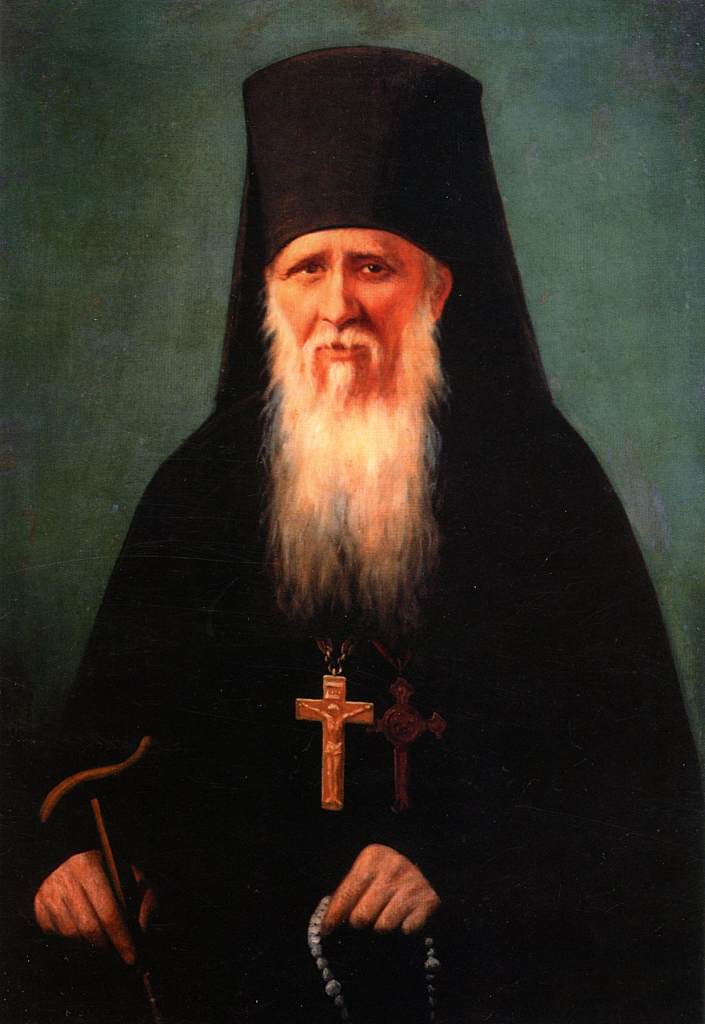 Saint Ambrose of Optina
Saint Ambrose of Optina
According to the account of his wife, Dostoevsky returned from that pilgrimage a changed man. This changed man, this final, highly spiritual iteration of Dostoevsky, is the one who wrote Brothers Karamazov.
We can see evidence of Saint Ambrose of Optina all throughout the book.
Saint Ambrose said, ?Prayer is food for the soul. Do not starve the soul. It is better to let the body go hungry.?
And in the book we get: ?The mystery of human existence lies not in just staying alive, but in finding something to live for.?
Saint Ambrose said, ?Live without cares, judge no one, vex no one, and honor everyone.?
And in the book, Father Zosima says, ?Be not proud. Be proud neither to the little nor to the great. Hate not those who reject you, who insult you, who abuse and slander you.?
The ethics of Saint Ambrose make up two major themes Dosteovsky is working with in Brothers Karamazov:
- Nourishing the soul is even more important than nourishing the body, for your soul, as cultivated through a virtuous life, outlives the body.
- A virtuous life is one that shows love for everyone in thought and deed, that honors everyone, that holds hatred in the heart for no one.
It?s through the characters of Alyosha and Zosima that Dostoevsky expresses these ethics. Zosima is a perfect match for Ambrose, able to live in total accordance with Saint Ambrose?s philosophy of life.
Alyosha, however, is still learning, and as he interacts with the world, that worldview of Saint Ambrose is tested.
One of the greatest tests of Alyosha?s worldview, a magnificent intellectual exercise in which Dostoevsky challenges his own theology, is in Book V, Chapter 5 of the novel: The Grand Inquisitor.
?The Grand Inquisitor? is a prose poem spoken aloud by Ivan Karamazov.
It is significant that Ivan is the character who gets to deliver this famous digression. Ivan, a young intellectual and deeply ethical man, wrestles with his faith throughout the novel.
Ivan believes that the notion of God doesn?t make sense in a world where there is so much suffering. In some of the most powerful writing in the novel, Ivan argues with his devout younger brother that the suffering of children in particular must disprove the existence of God because, if it doesn?t, then God is a terrible being who is unworthy of our belief anyway.
?Can you understand why a little creature, who can?t even understand what?s done to her, should beat her little aching heart with her tiny fist in the dark and the cold, and weep her meek unresentful tears to dear, kind God to protect her?? Ivan says, after telling a story of a little girl who is horribly abused and left to bang on the door of a locked cell where she?s kept. ?Do you understand that, friend and brother, you pious and humble novice? Do you understand why this infamy must be and is permitted??
But Ivan?s burgeoning atheism is neither simple nor consistent. Ivan has thought at length about how to create a better society, and in his worldview, there is a definite place for the Church. In the early chapters of he novel, we learned that Ivan is a proponent of ?Ecclesiastical Courts,? that is: he wants the Church to run Russia?s legal system.
Why would an atheist want the Church to be in charge of the courts?
Because he is convinced that if the Church were the legal authority, the notion of crime itself would change. People would be less likely to commit crimes because they would know they weren?t just acting against they state, but were acting against God.
As we come to the Grand Inquisitor section of the novel, the Ivan Karamazov we know is a character with a well-defined value system and a worldview based on love for his fellow man. When Dostoevsky allows Ivan to be the voice of the Grand Inquisitor, he is putting the digression on even footing with his own worldview, even though his philosophy and Ivan?s are opposed.
The result is one of the most studied and debated passages in the history of modern literature.
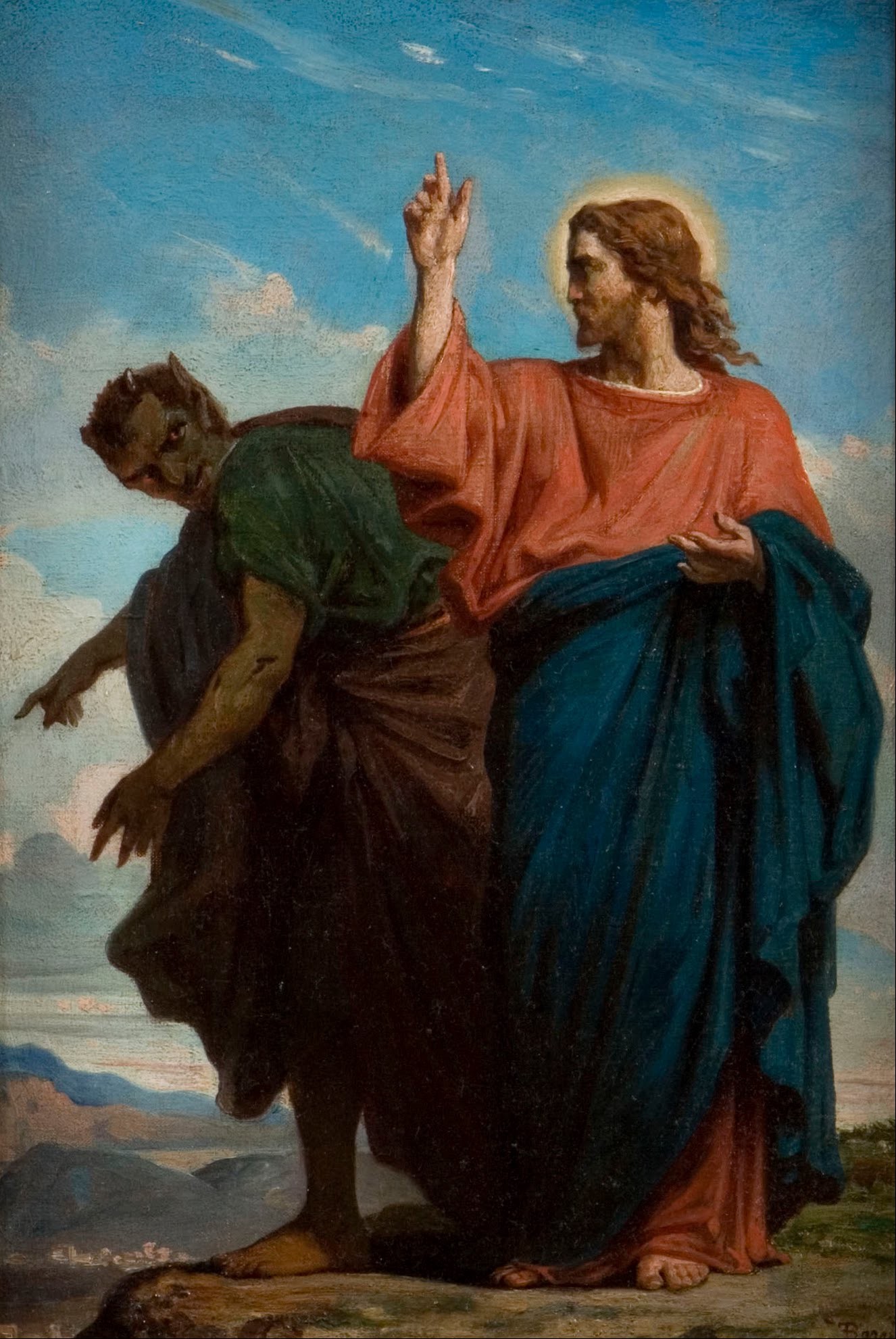 Satan Tempts Jesus in the Wilderness
Satan Tempts Jesus in the Wilderness
In the Gospel of Matthew, Jesus goes into the wilderness on an extended retreat of fasting and prayer, and while he?s there, Satan appears to him and delivers three challenges:
Challenge 1: Perform a miracle. ?And the tempter came and said to him, ?If you are the Son of God, command these stones to become loaves of bread.??
But Jesus refuses to perform a miracle.
Challenge 2: Prove you are the son of God. ?If you are the Son of God, throw yourself down; for it is written, ?He will give his angels charge of you,? and ?On their hands they will bear you up, less you strike your foot against a stone.??
But Jesus refuses to prove he is the son of God.
Challenge 3: Worship me and be king of the World. ?Again, the devil took Him to a very high mountain, and showed Him all the kingdoms of the world and the glory of them; and he said to Him, ?All these I will give you, if you will fall down and worship me.??
But Jesus rejects the offer.
The Grand Inquisitor wants to relitigate that night. The Inquisitor believes that, in those three challenges, Satan gave Jesus the opportunity to save humanity from needless suffering.
?Judge thyself who was right!? the Grand Inquisitor says to Jesus, ?Thee or he who questioned Thee when??
When Jesus refused the challenges, the Inquistor argues, he squandered an opportunity to purge suffering from the world.
In Dostoevsky?s view, when Jesus turned Satan away three times, he forced humanity to bear the burden of spiritual freedom, of choosing to believe or not to believe, and spiritual freedom is central to Dostoevsky?s view of God, man, and faith.
The Grand Inquisitor, however, looks at the idea of spiritual freedom, and condemns it. For him, freedom is a burden that most humans are simply unable to shoulder.
?Freedom, free thought and science, will lead them into such straits and will bring them face to face with such marvels and insoluble mysteries, that some of them, the fierce and rebellious, will destroy themselves,? the Inquisitor says. ?Others, rebellious but weak, will destroy one another while the rest, weak and unhappy, will crawl fawning to our feet.?
If the Inquisitor is starting to sound to you like a harbinger of 20th century totalitarian regimes, you?re not alone. Many critics recognize that The Grand Inquisitor seems to predict the horrors of Communism, Fascism, and Nazism.
?Receiving bread from us, they will see clearly that we take the bread made by their hands from them, to give it to them, without any miracle. They will see that we do not change the stones to bread, but in truth they will be more thankful for taking it from our hands than for the bread itself! For they will remember only too well that in old days, without our help, even the bread they made turned to stones in their hands.?
One of the amazing things about The Grand Inquisitor is that it was so prescient about where much of the world was headed, even though predicting the future wasn?t the poem?s purpose.
The purpose of The Grand Inquisitor is for Ivan to lay out a well-defined social ethic that challenges Alyosha?s spiritual worldview.
That ethic is the one Ivan argued earlier in the novel when he made the case for Ecclesiastical Courts.
?They will tremble impotently before our wrath, their minds will grow fearful, they will be quick to shed tears, but they will be just as ready at a sign from us to pass to laughter and rejoicing, to happy mirth and childish song.?
The Grand Inquisitor sounds at times like a megalomaniac, but his motives are pure, at least in his own mind. His aim is to relieve human suffering.
?In his old age he reached the clear conviction that nothing but the advice of the great dread spirit could build up any tolerable sort of life for the feeble, unruly incomplete empirical creatures created in jest.?
Dostoevsky recognizes that only the emotionally strong can embark on a life of faith like Zosima and Alyosha do. Ivan recognizes it too, but while Dostoevesky believes the spiritual freedom to choose or not choose a life of virtue is primary, he creates Ivan to believe that spiritual freedom is too heavy a burden for the masses to bear.
Ivan would have the strongest among us bear the burden of freedom for all of us. In his speech, The Grand Inquisitor presents himself as the strongest of all, ready to suffer for all:
?I too have been in the wilderness, I too have lived on roots and locusts, I too prized the freedom with which Thou hast blessed men, and I too was striving to stand among Thy elect, among the strong and powerful, thirsting ?to make up the number.? But I awakened and would not serve madness. I turned back and joined the ranks of those who have corrected Thy work. I left the proud and went back to the humble, for the happiness of the humble.?
The Grand Inquisitor is Ivan?s rationalization, and Dostoevsky?s condemnation, of any institution that would take away an individual?s spiritual freedom in order to create a world with less suffering. It is a devout Russian Orthodox criticizing the history of the Catholic Church in Europe, and also a former Russian radical speaking to the radicals who came after him. It is a warning from Dostoevsky to all the would-be social reformers at work in Russia and throughout the world in the 19th Century, the idealists who strove to create new social systems to replace the old monarchies.
Dostoevsky is telling all of them that institutions and social structures don?t matter if the hearts of the people they serve aren?t free. He is telling us that the creation of a better world doesn?t happen at the level of government and institutions; it happens one human heart at a time.
In The Grand Inquistiory, Dostoevsky allows Ivan to dig a theological hole for himself, one that shows the problems of putting social systems before individual virtue. It?s a theme Dostoevsky revisits many times in Brothers Karamazov. The idea that before you can decide the best way to structure the societies in which people live, you need to be clear on what everyone is living for. Any would be reformer who places material wealth, security, and comfort ahead of spiritual freedom is acting as The Grand Inquisitor in the poem, which is to say, is acting as a tormentor and interrogator of Christ himself. Spiritual freedom, Dostoevsky tells us, is an immense burden, humanity?s greatest, but any attempt on our part to alleviate that burden, even one motivated by sympathy for the suffering, is not only wrong, but is in defiance of God.
Dostoevsky believes the entirety of a life?s work for the ethical man comes in exercising his spiritual freedom, every day, in every moment, to choose the difficult life of virtue over the easy life of worldly comfort.
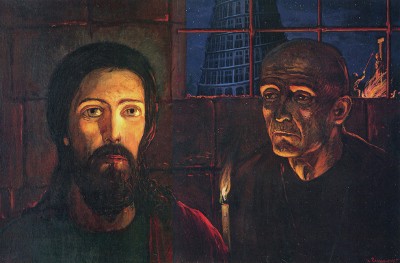
Throughout the Grand Inquisitor, Christ is invited to speak, but he never does. He simply remains in place, listening to the Inquisitor give his monologue. When the monologue is over, and the Inquisitor invites Christ to leave, before he goes, Christ kisses the Inquisitor on ?his bloodless aged lips.?
And then Ivan and Alyosha finish their conversation.
They talk of faith, of strength to endure, of the possibility of morality without God. Ivan asks Alyosha if he condemns him now that he?s heard Ivan?s belief system as stated in The Grand Inquisitor.
At this moment, Dostoevsky lets us know which of these two brothers, with their contrasting ethics and political philosophies, is walking in the true path of virtue.
At the question of whether devout Alyosha will renounce his brother after hearing The Grand Inquisitor, Alyosha gets up from his chair, goes to his brother, and kisses him on the lips.
